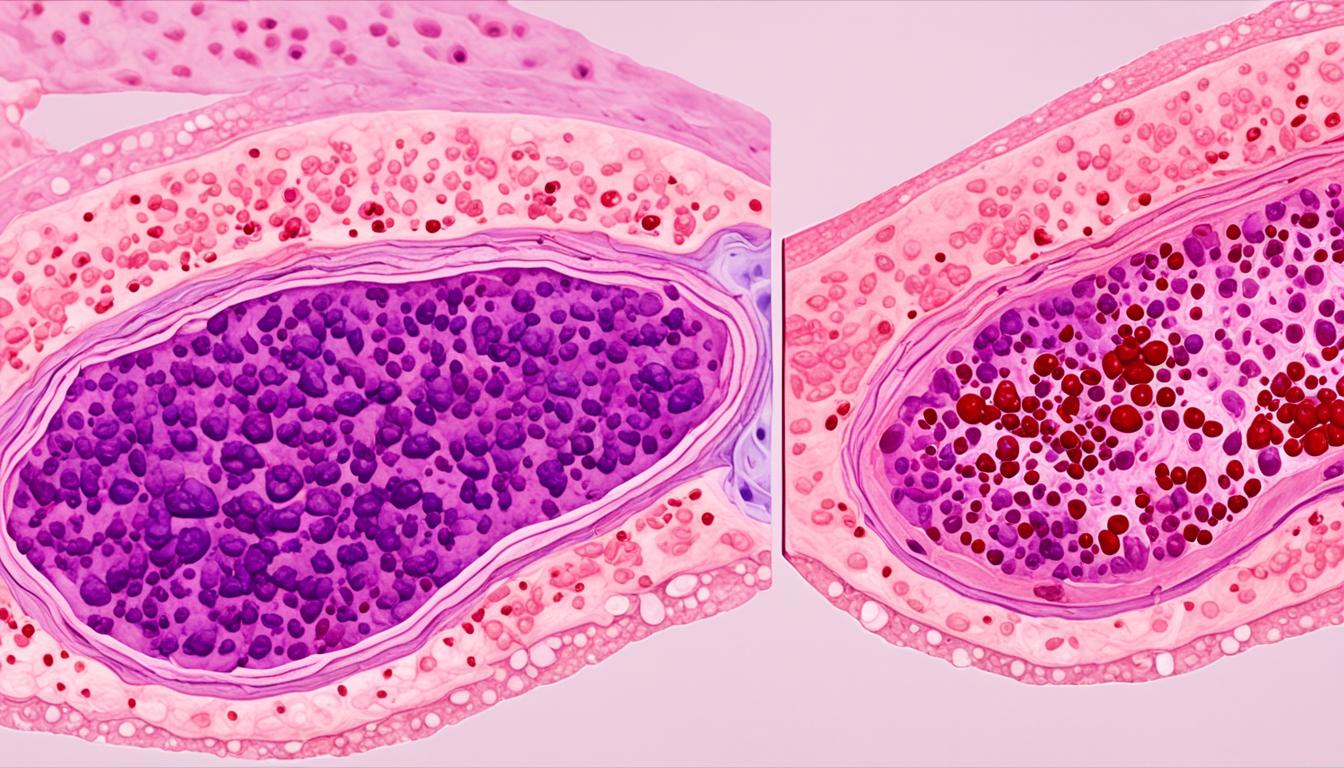Vaginal cancer is a rare type of cancer. It starts when cancer cells grow in the vagina. There are different types, but squamous cell carcinoma is the most common. It mainly affects older women. Another type, adenocarcinoma, can spread to other body parts. Clear cell carcinoma is rare and might be linked to DES.
Infection with HPV is a common cause of vaginal cancer. Symptoms include unusual vaginal bleeding, unusual discharge, and pelvic pain. Pain during sex or when urinating can also happen. To diagnose, doctors do a pelvic exam, Pap test, and sometimes a biopsy. Treatment may involve surgery, radiation, or chemo. The prognosis depends on the cancer’s stage, the patient’s health, and age.
Key Takeaways:
- Vaginal cancer is a rare form of cancer that develops in the vagina.
- Common symptoms include abnormal vaginal bleeding, discharge, pelvic pain, and pain during sex or urination.
- Diagnosis involves a pelvic exam, Pap test, colposcopy, and biopsy.
- Treatment options include surgery, radiation therapy, and chemotherapy.
- Prevention measures, such as safe sex practices and HPV vaccination, can reduce the risk of vaginal cancer.
Risk Factors and Prevention of Vaginal Cancer
Knowing about the risk factors for vaginal cancer is crucial to prevent it. Factors like getting older, a history of diethylstilbestrol (DES) use, and alcohol intake raise the risk. So does having had cervical cancer before, HIV, or smoking. Also, if you’ve had unusual cells in your vagina (vaginal intraepithelial neoplasia).
Infection with human papillomavirus (HPV) is the top cause of vaginal cancer. To lower your risk, here’s what you can do:
- Advanced age.
- Exposure to diethylstilbestrol (DES) in utero.
- Alcohol consumption.
- Cervical cancer or precancerous lesions.
- HIV infection.
- Smoking.
- Vaginal intraepithelial neoplasia, which refers to the presence of unusual cells in the vagina.
Wait to become sexually active until you’re older. Use condoms every time you have sex. Also, have regular Pap exams. They check for any early signs of cancer. And get the HPV vaccine to lower your chances of getting HPV.
Spotting vaginal cancer early is key to treating it successfully. Be on the lookout for symptoms like:
- Abnormal vaginal bleeding.
- Unusual discharge.
- Pelvic pain.
- Pain during sex or when you pee.
Screenings like Pap tests are key. They can catch cancer early, when it’s easier to treat. Make sure to see your doctor regularly. They can tell you when you need tests.
Diagnosis and Treatment of Vaginal Cancer
Diagnosing vaginal cancer involves several steps. This includes a physical exam, a Pap test, and a colposcopy. A biopsy is also done to check for cancer.
Imaging tests like X-rays and CT scans help see if cancer has spread. These tests look into other areas of the body.
The type and stage of vaginal cancer decides how it’s treated. Usually, surgery is needed. This might mean removing part of the vagina or even all of it.
Radiation therapy uses strong X-rays to shrink and kill cancer cells. Chemotherapy can also be used. It comes in pills, through a vein, or as a cream.
For advanced cases, doctors might suggest stem cell therapy. This new approach aims to fix damaged cells with special stem cells.
Discussing treatment options with your healthcare team is very important. They will help find what’s best for you.
Table: Treatment Options for Vaginal Cancer
| Treatment Method | Description |
|---|---|
| Surgery | Removal of tissue, growths, or the entire vagina |
| Radiation Therapy | Using high-powered X-rays or radioactive substances to kill cancer cells |
| Chemotherapy | Administered orally, intravenously, or topically to stop cancer growth |
| Stem Cell Therapy | Replacing or repairing damaged cells using specialized stem cells |
Conclusion
Vaginal cancer is rare but can be very hard on a person both physically and emotionally. Luckily, we now have better ways to find, treat, and support those with the disease. Knowing about the risk factors, signs, and how to help prevent it is key. By getting regular check-ups and catching it early, treatment can be more successful.
Getting help from others and special care for survivors is important in dealing with vaginal cancer. There are support groups and counseling to offer a hand along the way. Remember, it’s important to not delay seeking help from a doctor and to use all available support to feel better and live a good life.
No one fights vaginal cancer alone. With the help of support, resources, and a strong spirit, patients can face their challenges better. It’s crucial to keep learning, get necessary medical help, and lean on support services as you move forward.

